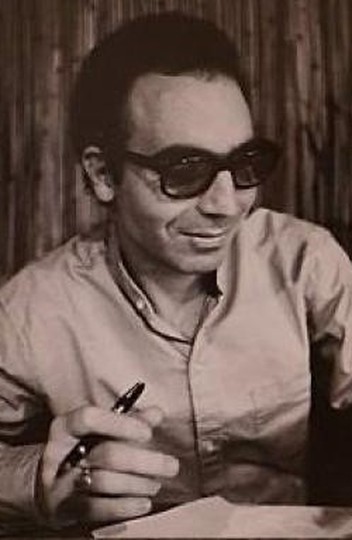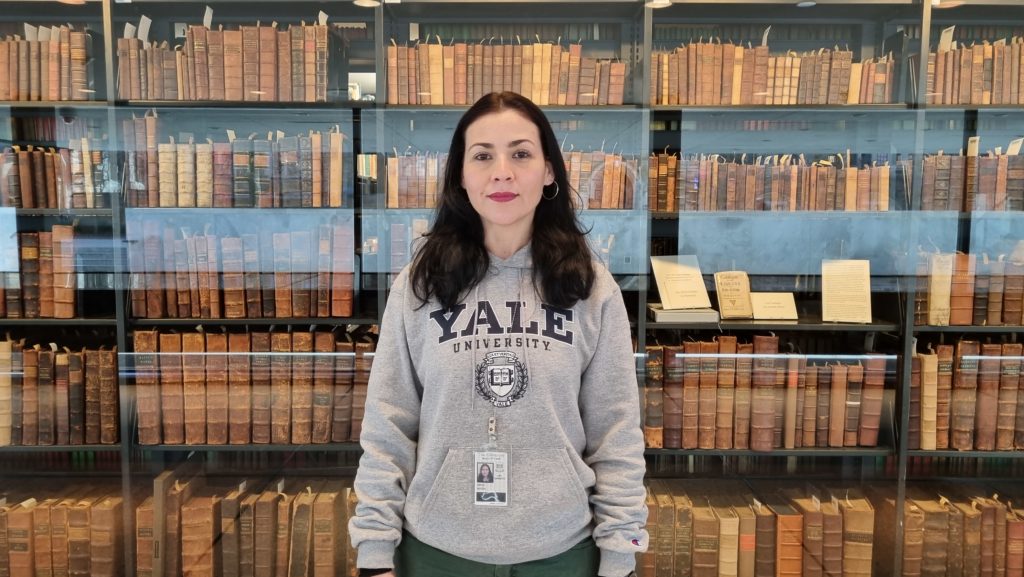São Paulo – The career of a Tunisian is the topic of the research of Brazil’s Joyce Karine de Sá Souza (pictured above). She’s studying the material produced by Mustapha Khayati, a cultural historian, social critic and political activist that was part of the Situationist International (SI). The movement, which had a no-border perspective of the world, was formed in the 1950s. The SI was made up of artists and intellectuals that were critical of the advanced capitalism and whose central focus was the construction of situations that could set up an environment favorable to change that.
The Brazilian scholar is now delving into documents of the author archived in the Beinecke Rare Book & Manuscript Library of the Yale University in the United States. She holds a doctoral degree from the Federal University of Minas Gerais (UFMG) and was selected for one of the scholarships granted to researchers. She started this journey last January. For five months — until May — she can research in the collection of the institution. Based on that the scholar plans on developing a series of projects related to content she founds these.
Her interest for the Tunisian author started when she was delving into the Situationist International. “I’ve always tried to make a radical critic to the political structure. In this sense, the SI gave me the framework to better understand this critique,” she said. Souza pointed out that the word “radical” comes from “root”. “Thus being radical is about tackling the root of the problem,” she said.
The researcher noticed that there was a lack of attention to the contribution of the Arab author to the movement. “Despite being from an internationalist group, he was known only via its European members. I saw that Khayati’s contribution was huge. The SI would never be what it is without his contribution. He’s still alive, and we even talk by e-mail,” she said.
Her goal was shedding light to his political thoughts, thus showing his relevance for the making the SI what it’s today. For Souza, the work of the Tunisian can even help explain the history of Latin America. “Especially in Brazil, where we can’t seem to settle accounts with our dictatorships,” she pointed out.
The material
In 2019, when she finished her doctoral studies, she started looking for more material to study the work of Khayati. “In my thesis I already gave him prominence. And watching a lecture by author Kevin Repp, he explained how most archives of the SI are in Yale, and since I made a lot of questions, he told me about the scholarship,” she said.

The scholarship was for the Beinecke Library, where most of the Situationist files are stored. When she was selected, Souza focused on her English and French studies, as most of her research is in French. “Now I can also read a bit of Arabic, and I plan on delving deeper into this language – but later. One thing at a time,” she said.
As her time is limited, she decided to focus on collecting and digitizing all the material. “It’s interesting that most texts of the SI were written without an authorship. Khayati is one of the few who maintained this internationalist dimension, as he wasn’t an European,” explained Souza, who carries out a work of a analysis to identify what are the works by the Tunisian.
And since the Situationists believe there’s no theory without praxis, the researcher says the works have different formats. The documents by the Tunisian include books by him, notes for manuscripts, unreleased books, and even a movie script, in addition to correspondence he received from around the world. Another relevant point of his careers was the support to the Democratic Front for the Liberation of Palestine, which features more Arabic writings.
Born in Soliman, Tunisia, Khayati became an orphan and moved to France, where he pursued his studies. But his move didn’t stop him from bringing his anti-colonialist views to the movement. “These Maghreb countries in particular have a discussion for the global South. This is really useful to analyze the totalitarian movements across Latin America. It’s in the margin. And only who’s in the margin can produce a border political thinking to provide a theoretical and practical basis for fighting the totalitarianism and authoritarianism that plague us from time to time,” she said.
The future
The researcher, who’s a columnist of the Sob Influência publisher, has finished a paper that gives an overview on the SI, and she has two book projects. “One is a translation from French into Portuguese, and the other is an introductory study with the manuscripts, showing the history behind [SI],” she explained. The texts resulted in actions and the pamphlet On the Misery in the Student Scene. The purpose of the book will be to show behind-the-scene glimpses of the productions of the pamphlet, one of the works the Tunisian didn’t sign. From the material, the Brazilian wants to bring the content and thinking of the Arab author to the Portuguese-speaking public.
Another project is being developed in partnership with another researcher. “I started doing it when I learned I’d been admitted, so I started looking for other people that were working on the same topic, but they are not Brazilians. I talked to El Hajoui, and he answered by introducing me to Anna O’Meara. We’re collecting interviews with former Situationists that are still alive and willing to participate. As well as people who were influenced by them like philosopher Giorgio Agamben,” she explained.
The Brazilian scholar stressed that the thinking still influences new generations. “Taken by its root, as the term radical does, the focus was on making alliances with massacred peoples like the Palestinians and the Kurdish. The effort that Khayati made in solidarity for these peoples… I believe that’s the word – solidarity – it’s defines well Khayati’s work,” she said.
Translated by Guilherme Miranda




